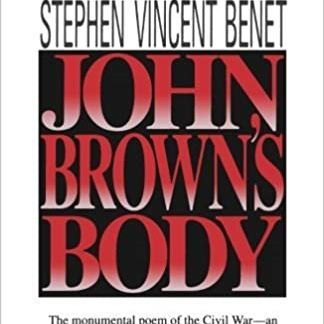John Brown's Body by Stephen Vincent Benet
- webmasteracwrtuk
- Jul 3, 2021
- 2 min read

In 1926 a man from Bethlehem Pennsyl vania published an extraordinary account of the American Civil war. It was largely but not entirely written in poetry, some rhyming, but mostly blank verse with varying metre. The breadth and extent of the work almost defies description, and many reviewers have not even tried, but I will try to do so and try to explain why it is unique and a valuable addition to our ACW exp e rience. It won the Pulitzer Prize and reviewers of the time said it was something that could not have been written 20 years previously.
The work starts with the advent of John Brown. It is not only good poetry but good history and the details of Brown’s demise accurately represented. It is the thoughts and reflections of the characters which makes it different and these reflections go on throughout the book. He is sympathetic to both Lincoln and Davis and you begin to get inside the agonies of the characters. Lincoln is constantly advised by people who know God’s will. He reflects that of all the people who should best know God’s will he is apparently the only one who doesn’t.
Likewise, Davis’ background and his qualities, good and bad, are carefully described. The sensitivity is exquisite. Not many histories would allow us into the mind of the madam, whose enthusiastic whore has a ‘secesh’ tattoo, only to have the town taken over by Yankees and has to hide her instead of working her! During 1st Manassas
Curly Hatton was nothing any more
but a dried throat and a pair of burnt black hands
that held a hot gun he was firing
though he no longer remembered why he fired.
Up the hill again. Damn tired of running up hill.
And then he found he couldn’t run any more,
he had to fall down to be sick. Even that was hard,
because somebody near kept making a squealing noise -
the dolefully nasty noise of a badly hurt dog.
Benét deals with the whole of the battles: the agonising of the commanders, the politicians, the horses, the men, the girls and the ladies. He notes the confused thoughts of the slaves who wanted freedom but saw their world changing into something unknown. He gets into their minds and reflects on how they remember their loved ones and what they were fighting for. He notes that Hooker said ‘you never see a dead cavalryman’ and asks why he asks why he never said ‘you never see a dead Congresman!’
I could go on and on but my copy is 336 pages! Now you kyou know about this Homerian work now about this Homerian work of of ourour war. Try it. It willwar. Try it. It will grow on you and is kind of addictive!grow on you and is kind of addictive!
Next time the subject will be a book that said that the American Civil War had been fought all wrong!








Comments